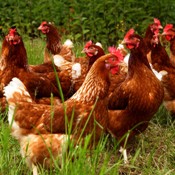Production method influences bacteria’s antibiotic resistance

US researchers have found that the prevalence of antibiotic resistant bacteria in poultry is significantly affected by whether the rearing method used is organic or conventional.
Campylobacter is a leading cause of food-borne illness, linked to the ingestion of contaminated foods including undercooked poultry, or other foods cross contaminated with raw poultry meat. Researchers have discovered that the Campylobacter species are becoming more resistance to antimicrobials because of the widespread use of these substances in humans and animals.
Researchers compared Campylobacter from the intestinal tracts of poultry from conventional farms (where antibiotics were used regularly) and organic farms (where antibiotics had never been used). Researchers found that the Campylobacter from the poultry from organic farms had less than 2% resistance to antibiotics, while the bacteria from the poultry in conventional farms had 46-67% resistance.
“This study revealed significant differences in antibiotic-resistant Campylobacter isolates between conventional poultry operations and organic poultry operations,” say the researchers. “These results suggest that the practice of antibiotic usage in conventional poultry production systems influence the prevalence of antibiotic-resistant Campylobacter organisms in conventionally raised broilers and turkeys.”
These findings appear in the May 2006 issue of the journal Applied and Environmental Microbiology.













